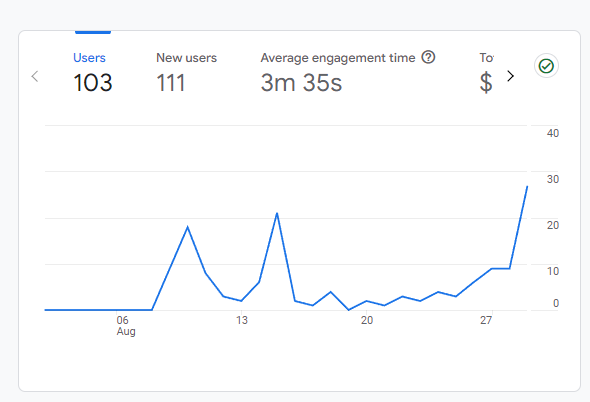There are few things more alarming as a marketer or business owner than questioning the integrity of your data. In a data-driven world it’s imperative to know the sources of your information and insights are credible. Trying to make important decisions with seemly mismatch data can rattle even most seasoned stakeholders. Thankfully, in most cases, additional context is all that’s needed to understand common inconsistencies.
Here’s some common data discrepancy questions that come up related to Google Analytics and Search Console to be aware of –
How do I have more New Users than Users?
The very first thing I noticed about the Nuaveu.com data reported in GA4 was that New Users were higher than Users – and sometimes by a larger margin than I was comfortable with. Some GA4 users even report seeing New Users reporting 8x higher than Users.

The reason many GA4 properties are reporting New Users as higher than Users is because the way the metrics are calculated. At midnight, each User engaging with the site becomes a New User despite not being counted again as a user.
It’s likely your website receives a lot of late-night traffic if you’re seeing the New User metric reported much higher than Users. While irritating, there isn’t any cause for alarm. The disparity between the metrics can be disconcerting, but the exact number of Users or New Users is rarely if ever the essence of any critical decision. In most cases it’s best to use these metrics directionally (i.e., are they going up or down) to help base decisions.
Why are my conversions in Google Ads different from Google Analytics?
Conversions between Google Ads and Google Analytics 4 will rarely if ever be the same because the two platforms attribute conversions differently. Google Ads uses the last ad click and GA4 uses the last click across all marketing channels. In addition, Google Ads reports the conversion against the date/time of the click and GA4 uses the date/time of the conversion itself.
This can be incredibly confusing for business owners and marketers who aren’t familiar with these nuances. And questions frequently arise since the data is often shared between platforms and reported side-by-side.
Why are my organic clicks different than my organic visits in GA4?
Throughout my career I’ve had a number of stakeholders get hung up on the fact the clicks (as reported by Google Search Console) are virtually always different than organic visits reported by Google Analytics (or another web analytics platform like Adobe Analytics).
On the surface the data collection seems simple enough – a user clicks your organic listing and becomes a visitor on the website with their acquisition channel attributed to organic search. So why wouldn’t the metrics be the same? Some of the most common reasons are:
- A user stops a page from loading or closes their browser after clicking
- Users may click an organic listing, visit the website and then return later
- A user can click on the same organic listing multiple times and still only be counted as a single visit
- Google may filter out invalid clicks or sample data differently between platforms
Most of the above is also applicable to paid search clicks and visits as well.
Conclusion
Data discrepancies can be confusing, irritating and sometimes scary until you understand the underlying cause. Working with a professional could be beneficial if you’re having a tough time navigating through confusing data. Contact us today for a free quote.
